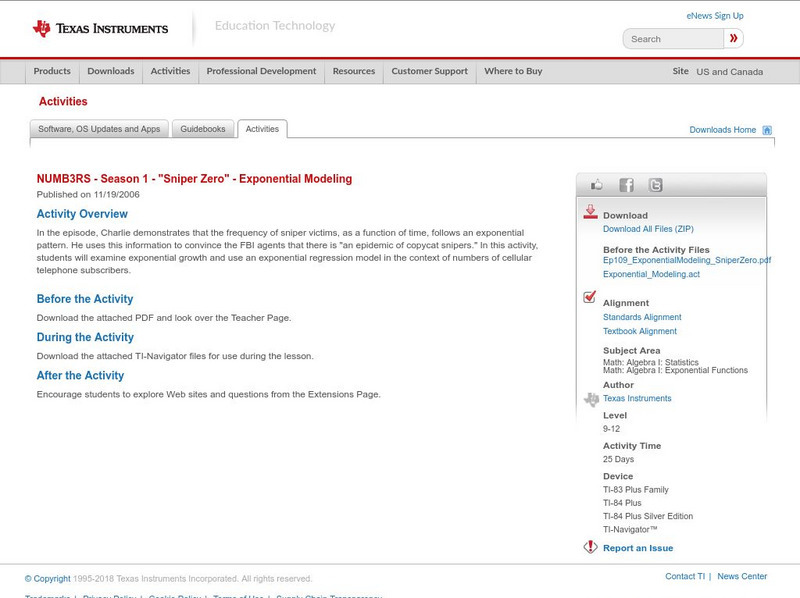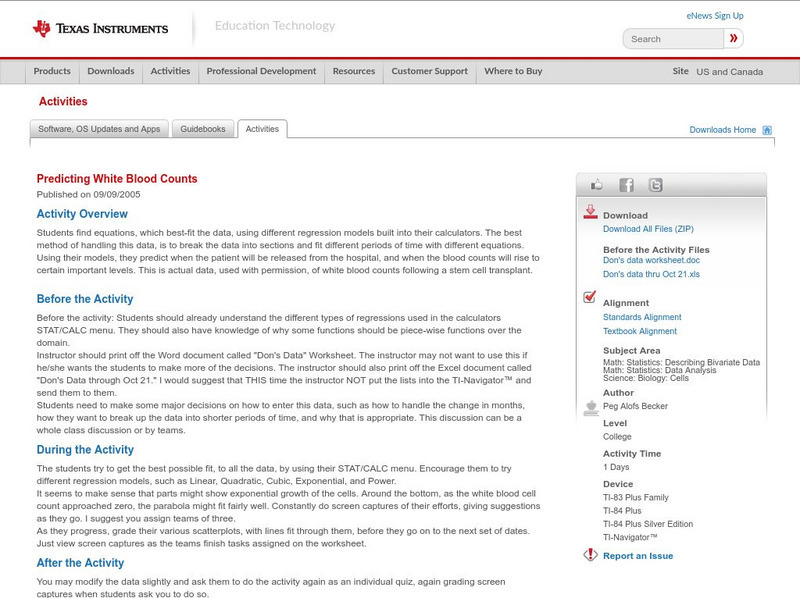Hi, what do you want to do?
Texas Instruments
Texas Instruments: Numb3 Rs: Exponential Modeling
Based off of the hit television show NUMB3RS, this lesson introduces students to exponential equations, their graphs, and their application in the real world. The lesson is framed in the context of the number of cell phone users for a...
US Department of Energy
Us Dept of Energy:mining Silicon Througha Single Displacement/redox Reaction
Students will participate in a laboratory investigation that models the production of silicon. The activity investigates the sources, uses, properties, and importance in the fields of photovoltaics (solar cells/renewable energy) of silicon.
Texas Instruments
Texas Instruments: Is There a Limit?
In this activity, students examine data about bacteria and their growth. They produce a scatter plot, a best-fit model, and draw conclusions based on the data and graph.
University of Missouri
Microbes in Action: Classroom Activities: Transfer of Diseases
A science experiment to observe how microbes are transferred by hand contact. This lab creates a model to show students how microbes transfer disease. One student will rub their hand with candy soaked in a yeast solution, then students...
Other
Molecular Movies: 3 D Tutorials for Biologists
A collection of visualization-oriented tutorials for creating 3D animations for use in your biology classroom. Search by difficulty level, software package, or 3D topic area.
Physics Classroom
The Physics Classroom: Common Misconceptions Regarding Electric Circuits
In this tutorial, preconceived ideas regarding the nature of charge flow and the role of a battery in a circuit are addressed. In many instances, these preconceived notions about charge flow and batteries are incorrect ideas and are...
Concord Consortium
Concord Consortium: Molecular Workbench Showcase: Biotech
Simulations of common biotechnology techniques performed in a laboratory setting. Learn how to complete these techniques and what task they are used for in the lab.
Exploratorium
Exploratorium: Microscope Imaging Station: Mitosis Flipbook
Use this series of images depicting the process of mitosis in the early embryo of the fruit fly, Drosophila melanogaster to make a mitosis flipbook. In this stage of Drosophila development, nuclei divide very rapidly without cell...
Bryn Mawr College
Serendip: Mitosis, Meiosis and Fertilization
Brief text summary of what students learn in the Mitosis, Meiosis and Fertilization lab, along with links to download Student Handouts in PDF and Word formats, and Teacher Preparation Notes in PDF format. The lab is a hands-on lesson...
Open Ed
Open Ed Sci: 8.1 Contact Forces
In this unit, students explore a variety of phenomena to figure out, "Why do things sometimes get damaged when they hit each other?" Student questions about the factors that result in a shattered cell phone screen lead them to...
Concord Consortium
Concord Consortium: Molecular Workbench: Molecular Crystals
A collection of interactive simulations relating to molecular crystals.
Idaho State University
Global Wind Systems [Pdf]
A great description of the global scale circulation and heat energy. Discusses a single-cell model, a three-cell model, jet streams and more.
Texas Instruments
Texas Instruments: Predicting White Blood Counts
Students find equations, which best-fit the data, using different regression models built into their calculators. The best method of handling this data, is to break the data into sections and fit different periods of time with different...













